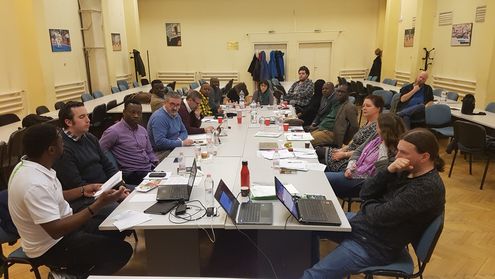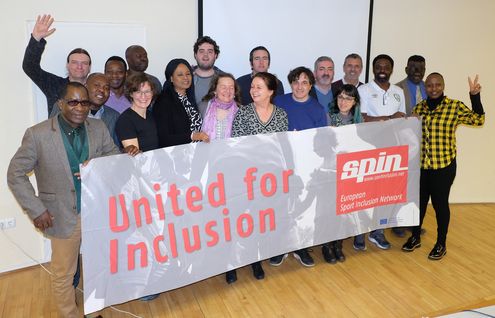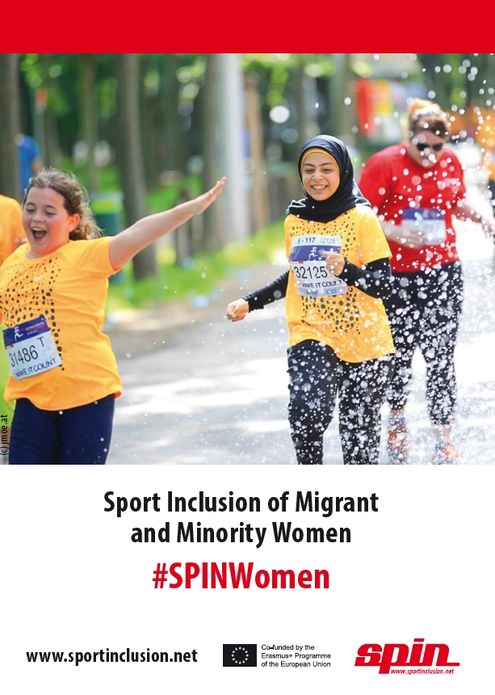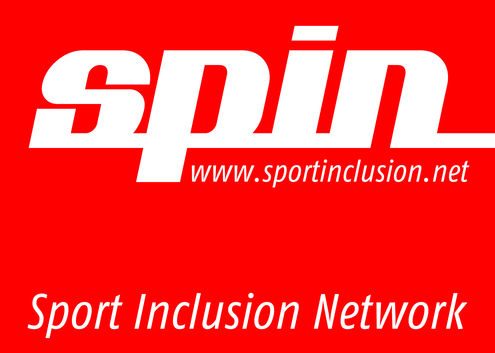Looking at society at large, migrant and ethnic minority women and girls are belonging to the most excluded and vulnerable groups. Across Europe women athletes and players with a migrant or minority background are underrepresented in organised sport and their contribution to sport is often invisible.
Against this backdrop the SPIN network developed the project “Sport Inclusion of Migrant and Minority Women” (SPIN Women), which was selected as one of the successful ERASMUS+ Collaborative Partnership projects. SPIN Women aims to encourage social inclusion and equal opportunities of women and girls with an immigrant or ethnic minority background through increased participation in sports.
Growing hostilities
The seven partner organisations met on 15 & 16 February in Budapest to kick-off the new initiative. The meeting at the Budapest Sport Union Auditorium was hosted by the Hungarian partner Mahatma Gandhi Human Rights Organisation (MGHRO). In his opening statement MGHRO president Gibril Deen highlights the difficulty to continue their human rights and intercultural work under the current nationalist policies in Hungary. A new law would criminalize the work of NGO’s as which defend the rights of asylum seekers.
Activist Getrude Onyejiaku reported about the growing sentiments against migrants in the country: “I came as a student to Hungary, but we start to live in fear. Hostilities are growing towards those who are legally here.” As a response the SPIN partner agreed to produce a solidarity T-shirt. The proceeds from the sale will go to the Hungarian partner to support their valuable work.
Roma women and sports
On Friday afternoon we heard an inspiring input from Balog Gyongyi, a PE teacher and activist with Roma background. She gave a presentation about the plight of Roma in Hungary. A low education level, lack of job opportunities, low social status and no proper access to health would result in a vicious circle for poverty and segregation. For Balog education and sport are ways to break out from this. To involve Roma girls in sport would be easy at a primary level, but increasingly difficult when they grow older, since teenager would have to perform adult roles in the community.
Barriers to proceed
On Saturday the focus of discussion was around understanding of the barriers that minority women and newly-arrived migrants (asylum seekers, refugees) face when they try to access sport. David Lenane, the FAI National Coordinator Women's Football presented the results of a survey in Ireland on the barriers for female coaches to proceed to the next levels of the coach education in Ireland. “The most common reason given was the lack of time to complete the coaching education, so we need more online elements. And there is a lack of role models, we have only two female pro license coaches, so there is hardly anyone to inspire!”
A key aim of the SPIN women project is to capacity-build, empower and increase qualification of female sport actors and multipliers (coaches, administrators, referees …) with migrant or minority background.
SPIN Women: Partners, Activities and Tools
The Erasmus+ project “Sport Inclusion of Migrant and Minority Women: Promoting sports participation and leadership capacities (SPIN Women)” will be coordinated by the fairplay initiative at the Vienna Institute for International Dialogue and Cooperation VIDC. Partners are the Football Association of Ireland (FAI), the Portuguese Professional Players Union (SJPF), Camino (Germany), Unione Italiana Sport per Tutti (UISP), Liikkukaa – Sport for all (Finland) and MGHRO (Hungary).
The SPIN Women project is designed to address the needs of by enhancing the participation of migrant and minority women and girls in sport and recreational physical activities. It aims to show the different perspectives of migrant and ethnic minority women and to develop strategies to increase their involvement in sports. This includes capacity-building and empowerment components which increases the qualification and skills of female sport actors and multipliers. Furthermore, the project is conceived to raises awareness and to advocate for policy change within public authorities and sport governing bodies.
Multiple discrimination of migrant women
The SPIN Women project employs a critical empowerment approach and pays attention to the intersectionality of migrant and minority women. The project is the first pan-European systematic sport initiative to focus entirely on fostering the inclusion of female refugees and asylum seekers as well as women with an ethnic minority background (such as Roma) in and through sport.
Over a period of two years a range of activities and measures will be implemented. The work streams are as following: 1. Research on successful strategies and empowerment: Creating an empirical base, 2. European training and connecting sport stakeholders, 3. Transnational Networking and advocating for policy change, 4. Education and Raising public awareness, and 5. Communication, Dissemination and Evaluation.
Deliverables of the project include a study report on successful inclusion strategies, action researches, Sport Inclusion toolkit, connecting online tool, animated educational video and the (In)Visible exhibition.
Next activities
The next activity of the project will be focus group interviews with sport educators, coaches, volunteers who work with migrant and /or ethnic minority women and girls. These group interviews will be conducted in all seven partner countries with the intent to identify successful inclusion strategies.
More information on: https://sportinclusion.net/
Project flyer (![]() pdf Download)
pdf Download)




